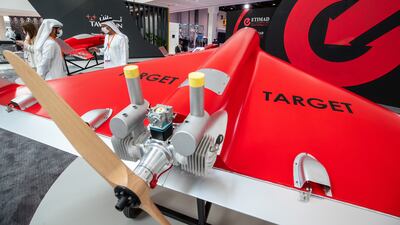New aerial drones introduced by an Emirati defence company have the ability to communicate and swarm to attack enemies on the ground.
Edge's showcase event for the Hunter 2 aerial fleet took place at the Unmanned System Exhibition and Conference (Umex) in Abu Dhabi.
“Many countries are investing in counter UAV capability and technology,” said Miles Chambers, director of business development, platforms and systems at Edge.
“To combat these systems, we need to be able to invest heavily in launching multiple systems to affect the target.”
Edge's swarming drones can be sent to strike airfields or road convoys. They are based on the Hunter 2 series of unmanned aerial vehicles (UAV) developed by its Halcon subsidiary.
“If one drone misses the target, other drones will be able to identify it,” said Khalifa Al Tamimi, design engineer at Halcon.
The aim is to hit targets precisely and minimise collateral damage. The swarming drones can be airborne in a matter of seconds. At take-off weight of 8 kilograms, the devices have a wingspan of 1.44 metres and are 1.25 metres long.
“Instead of sending a single drone, you have multiple drones that communicate with each other. They can cover more area and also identify targets faster and more efficiently,” Mr Al Tamimi said.
The Edge stand at Umex displayed drones from the Hunter range, including the tube-launched Hunter 10 that can be fired from the back of a vehicle. It carries a payload of 10kg.
The Hunter 5 was also on show at Umex. It can carry a 5kg payload to an altitude of 1,500 metres. All the aerial vehicles are designed, manufactured and assembled in the UAE.
“All of these drones are tube-launched, making them very easy to deploy rapidly in any environment,” Mr Chambers said.
Another UAV displayed at Umex was the surveillance and combat drone Reach S. With a take-off weight of 400kg it can carry a payload of up to 120kg. The drone has a wingspan of 10 metres and is 5.5 metres long.
“Edge is really focusing on developing indigenous defence capabilities in the UAE, that's both to serve the indigenous market, as well as internationally. It is certainly going to play an ever-increasing role and importance in national security around the world,” Mr Chambers said.



























